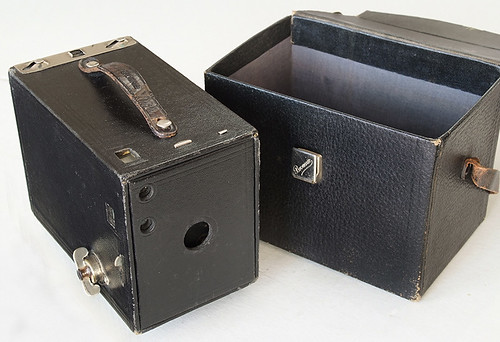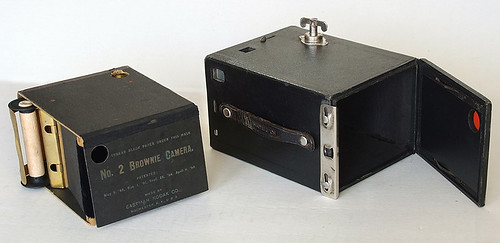Difference between revisions of "No. 2 Brownie Camera"
m (Added nowiki to ISBN) |
Hanskerensky (talk | contribs) (Added link to user manual page) |
||
| (3 intermediate revisions by 3 users not shown) | |||
| Line 8: | Line 8: | ||
|image_rights= wp | |image_rights= wp | ||
}} | }} | ||
| − | The '''No. 2 Brownie Camera''' was made for over 30 years by Eastman [[Kodak]]. It evolved through many models manufactured between 1901 and 1933. They | + | The '''No. 2 Brownie Camera''' was made for over 30 years by Eastman [[Kodak]]. It evolved through many models manufactured between 1901 and 1933. They make 2¼×3¼ inch exposures on 120 rollfilm - which was introduced for this camera.<ref>{{McKeown12}} Page 477.</ref>. The first model is made of cardboard and wood and has fine grain black leatherette covering. It has a sliding latch on top for locking the hinged back. Film has to be loaded under a flap on the film carrier. Later models have a coarser grained covering and a spring catch for the back. Models made after 1924 have an aluminium body. There were models B, C, D, E and F. Model F was also made by [[Kodak Ltd.]] in the UK and from 1929 they were available in colors as well as black.<REF name="Coe">Brian Coe, Kodak Cameras, the First Hundred Years (Hove, UK: Hove Foto Books, 1988; <nowiki>ISBN 0-906447-44-5</nowiki>) p.38.</REF> |
{{Flickr_image | {{Flickr_image | ||
| Line 26: | Line 26: | ||
<references/> | <references/> | ||
| + | ==Links== | ||
| + | *[https://www.butkus.org/chinon/kodak/kodak_brownie_2/kodak_brownie_2.htm No. 2 Brownie Camera user manual] at [https://www.butkus.org/chinon/ Butkus.org] | ||
| − | [[Category:Kodak]] [[Category:6x9 box]] | + | [[Category:Kodak|No.2 Brownie Camera]] |
| + | [[Category:6x9 box]] | ||
| + | [[Category:N|No.2 Brownie Camera Kodak]] | ||
| + | [[Category:B|Brownie Camera No.2 Kodak]] | ||
| + | [[Category:1900-1905]] | ||
Latest revision as of 07:00, 2 December 2021

|
| The 1902 No. 2 Brownie camera with original Brownie case. image by Geoff Harrisson (Image rights) |
The No. 2 Brownie Camera was made for over 30 years by Eastman Kodak. It evolved through many models manufactured between 1901 and 1933. They make 2¼×3¼ inch exposures on 120 rollfilm - which was introduced for this camera.[1]. The first model is made of cardboard and wood and has fine grain black leatherette covering. It has a sliding latch on top for locking the hinged back. Film has to be loaded under a flap on the film carrier. Later models have a coarser grained covering and a spring catch for the back. Models made after 1924 have an aluminium body. There were models B, C, D, E and F. Model F was also made by Kodak Ltd. in the UK and from 1929 they were available in colors as well as black.[2]

|
| Film carrier showing flap & swing-out spool holder. image by Geoff Harrisson (Image rights) |
Notes
- ↑ McKeown, James M. and Joan C. McKeown's Price Guide to Antique and Classic Cameras, 12th Edition, 2005-2006. USA, Centennial Photo Service, 2004. ISBN 0-931838-40-1 (hardcover). ISBN 0-931838-41-X (softcover). Page 477.
- ↑ Brian Coe, Kodak Cameras, the First Hundred Years (Hove, UK: Hove Foto Books, 1988; ISBN 0-906447-44-5) p.38.